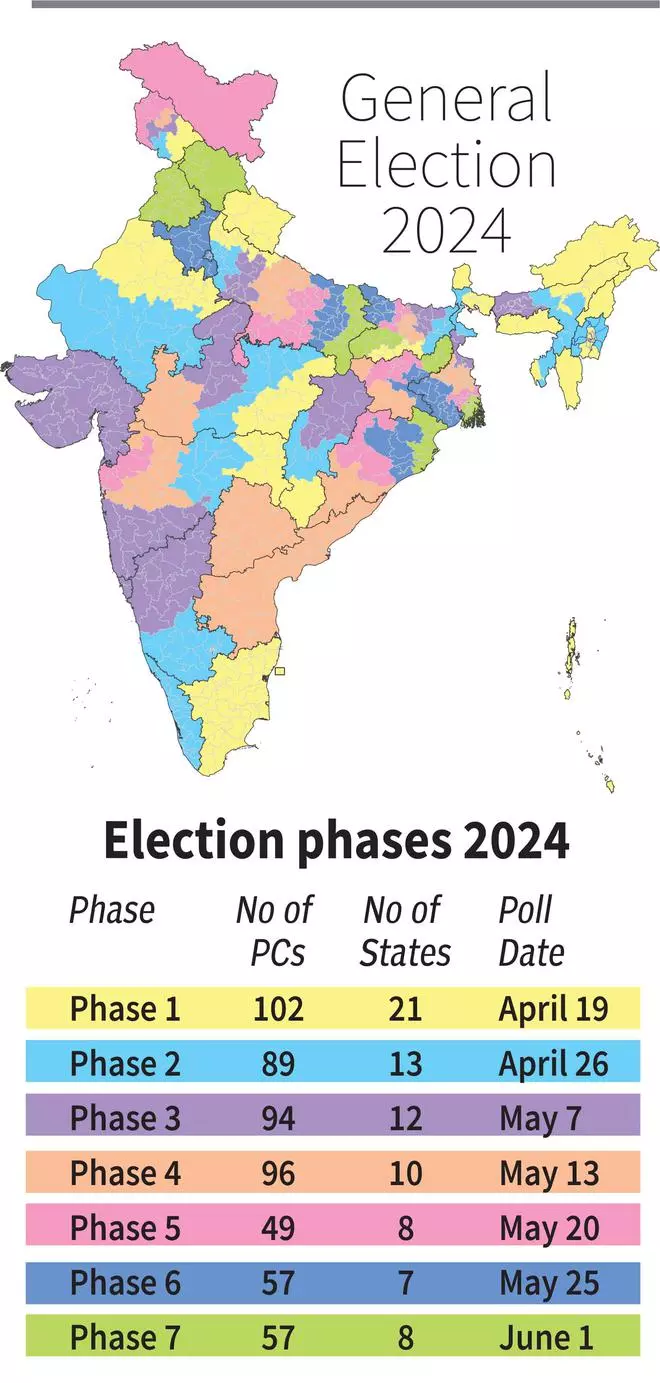The Lok Sabha polls will be held in seven phases, beginning April 19, in which the fate of 102 seats across 21 states will be sealed to the last phase on June 1 in 57 seats in 8 states, the Election Commission said announcing the detailed poll schedule for the General Elections as as well as assembly polls in four states and by-elections in 26 constituencies.
Counting will be held for all the seats on June 4, Tuesday. In all the past General Elections at least since 1991, counting was not held on Tuesday, considered an auspicious day with temple visit. The entire election process will be completed by June 6, well before the end of the tenure of the current Lok Sabha that gets completed on June 16.
As per the schedule, the second phase poll will be held on April 26, covering 89 seats in 13 States, the third phase on May 7 in 94 seats in 12 States, fourth phase on May 13 in 96 seats in 10 States, fifth phase on May 20 in 49 seats in 8 States and sixth phase on May 25 in 57 seats in 7 States.

Its interesting to note that of the 26 assembly constituencies in which by-elections will be held, six seats are from Himachal Pradesh. In the recently concluded Rajya Sabha elections, the six Congress MLAs who defied the party whip and also did not attend the budget session got disqualified. As a result of which the seats got vacant.
People living in camps in violence-hit Manipur will be allowed to vote from their camps in the polls. The Commission also said that poll in Jammu and Kashmir, which got delayed due to delimitation technicalities, will be held after the conclusion of the General Elections as deployment of adequate security forces will be possible by then.

Joined by two newly appointed Election Commissioners – Gyanesh Kumar and Sukhbir Singh Sandhu, Chief Election Commissioner (CEC) Rajiv Kumar said that the Commission will ensure a free and fair election where close to 97 crore registered voters spread across the 543 Lok Sabha constituencies will elect their Member of Parliament (MP).
The CEC also said that there should be an end to the debate on EVM as the Commission has established the fairness of the device in last many elections.
Touching upon the model code of conduct (MCC), Rajiv Kumar said that any violations of it will be judged on past performance record of the candidates whether they were earlier also violated the code or not as the EC has all the past records maintained. He denied the allegation that the EC sends more notices to Opposition leaders than the ruling BJP on MCC violations, and said that the past record shows that the Commission is always fair and never hesitates to take action irrespective of the power and position of any leader.
Apart from MCC, he also mentioned about the Commission’s plans to tackle three more challenges – money power, muscle power and misinformation. The Election Commission will also have its own fact checking unit devoted to the elections to curb misinformation, he said adding it will be available on the official website.

Pointing out the deteriorating condition of political discourse, the CEC said, “we have issued a strong advisory to the political parties. We have collated all the violations during the last five years and based on that we have come out with a final advisory. We are putting political parties on notice, we have asked them to give a copy of the guidelines to each star campaigner. We will presume knowledge of the guidelines. These are a few fundamental changes that we have made,” Kumar said.
In the 2019 poll, the BJP won 303 seats, Congress 52, Trinamool Congress 22, BSP 10, NCP 5, CPI-M 3 and CPI 2. However, the BJP has unleashed a major campaign to cross 400 seats by harping on “fulfilment of Modi’s guarantee” and its vision to make India a developed country by 2047.
Whereas the Opposition, ‘INDIA’ block, has not yet sorted out seat adjustments and some parties like Janta Dal (United) and Rashtriya Lok Dal (RLD) have already left the alliance and joined hands with BJP. Trinamool Congress too have announced that it would fight the poll alone, without any alliance.
The CEC did not respond to a question about non-disclosure of the unique numbers with regard to the electoral bonds. The Supreme Court on Friday issued a notice to SBI over non-disclosure of the numbers unique to each electoral bond, Such numbers can help one to identify a donor’s contribution to a political party through the bond.
But, Rajiv Kumar said that the Commission has always been in favour of transparency as far as electoral bonds are concerned. At the same time he stressed that donors’ privacy be protected.
“In democracy, there is no scope for hiding things, it is all about making everybody know, we are all for transparency. This is the first part of the exercise that it must be known. The country now has to ask and find solutions through an institutional mechanism where the donor’s privacy is also considered,” he said.







